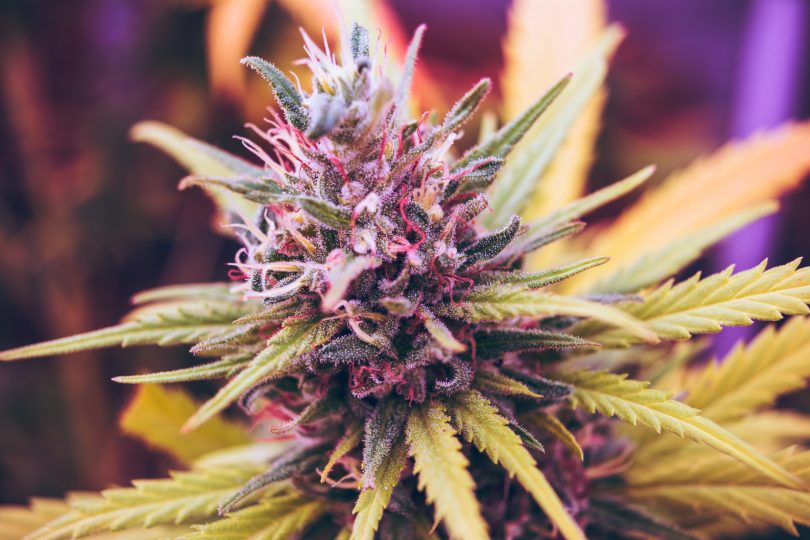There is growing evidence in the scientific literature that cannabidiol (CBD) and other cannabinoids, individually and in sum, are positively impacted by terpenes.
This is a theory that has been gaining increasing recognition thanks to the work of American cannabis researcher Dr. Ethan Russo. [1] At the turn of the last decade, Russo began realizing that the essential oils of cannabis (terpenes and terpenoids) may synergize with cannabinoids to amplify therapeutic outcomes.
Broadly, this phenomenon is called the entourage or ensemble effect. [2]
At least 150 terpenes have been identified in the cannabis plant so far, and although dependent on which cultivars are grown and for which conditions, there are several that are particularly noteworthy. [3,4] Terpenes exist in the plant in the first place to protect it from insects and natural conditions. They are produced in the glands of the cannabis plant known as trichomes which also produce cannabinoids.
These essential oils by themselves can have psychoactive effects that stimulate, sedate or arouse. [5] Terpenes are also commonly found in wine, certain kinds of fruits (including citrus fruit), and herbs. [1,5,6]
How Does the Entourage Effect Theory Work?
Terpenes are ubiquitous in nature and many common herbs and plants have the same terpenes found in cannabis. The idea behind the entourage effect is that terpenes found within and beyond the cannabis plant can boost or modulate the therapeutic efficacy of cannabinoids which interact with the body’s endocannabinoid system (ECS), a biological system that helps regulate homeostasis and, therefore, wellness. At the very least, they influence the consumer’s experience.
Terpenes act on various bodily systems which help regulate major functions like sleep, appetite, mood, and motor control. [7] One terpene, β-caryophyllene, also activates cannabinoid type 2 receptors in the ECS.
“CBD can be useful, but so can myrcene, pinene, or caryophyllene, the latter of which also comes with anti-inflammatory and analgesic effects too,” Dr. Russo explained in a recent interview with Terpenes & Testing.
Indeed, research has indicated that terpenes can have a modulating or stimulatory effect on THC (delta-9-tetrahydrocannabinol). [8] Combinations of CBD and terpenes may ameliorate some of the unwanted effects of intoxicating cannabinoids. [8] Other cutting-edge scientific investigation bears great potential for the clinical use of whole plant cannabis extracts in the future.
References:
- Russo E. Taming THC: potential cannabis synergy and phytocannabinoid-terpenoid entourage effects. British Journal of Pharmacology. 2011;163(7):1344–1364. Impact factor: 7.73; Times cited: 603
- Russo E. The case for the entourage effect and conventional breeding of clinical cannabis: no “strain,” no gain.” Frontiers in Plant Science. 2019;9(1969). doi:10.3389/fpls.2018.01969. Impact factor: 4.407; Times cited: 42
- Booth J, Bohlmann J. Terpenes in Cannabis sativa – From plant genome to humans. Plant Science. 2019;284:67-72. Impact factor: 3.591; Times cited: 30
- Atakan Z. Cannabis, a complex plant: different compounds and different effects on individuals. Therapeutic Advances in Psychopharmacology. 2012;2(6):241–254. Impact factor: 3.000; Times cited: 142
- Lupoi, J. The Cannabis Terpene Experience, Mace Media Group, Pismo Beach, 2020.
- Bergler G, Picou C. Dispersive liquid-liquid microextraction for the qualitation of terpenes in wine. Journal of Agricultural and Food Chemistry. 2020. Impact factor:4.192; Times cited: N/A
- Ferber S, et al. The ‘entourage effect’: terpenes coupled with cannabinoids for the treatment of mood disorders and anxiety disorders. Current Neuropharmacology. 2019;18(2). Impact factor: 4.668; Times Cited: 4
- Russo E, McPartland J. Cannabis and cannabis extracts: Greater than the sum of their parts? Journal of Cannabis Therapeutics. 2001. Impact factor: N/A; Times cited: 196
Photo credit: Esteban Lopez, Unsplash








